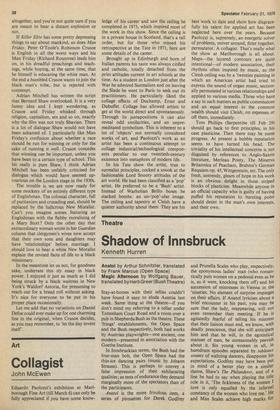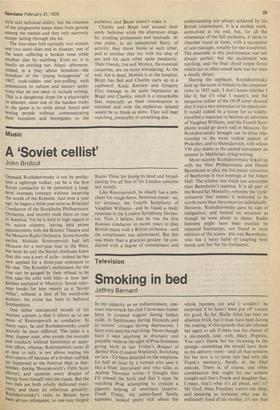Theatre
Shadow of Innsbruck
Kenneth Hurren Anatol by Arthur Schn itzler, translated by Frank Marcus (Open Space) Magic Afternoon by Wolfgang Bauer, translated by Herb Greer (Bush Theatre)
Stay-at-homes with their tellies couldn't have found it easy to elude Austria last week. Same thing at the theatre—if you don't mind my referring to a cellar under Tottenham Court Road and a room over a pub in Shepherds Bush as the theatre. These 'fringe' establishments, the Open Space and the Bush respectively, both had works by Austrian playwrights—one ancient, one modern—presented in association with the Goethe Institute.
In Innsbruckian terms, the Bush had the four-man bob, the Open Space had the thin-ice dancing pairs (music by Johann Strauss). This is perhaps to convey a false impression of their exhilarating qualities; as tests of endurance they demand marginally more of the spectators than of the participants.
Anatol is the more frivolous item, a series of pirouettes for Derek Godfrey
and Prunella Scales who play, respectively, the eponymous ladies' man (who romantically puts women on a pedestal even as he is, as it were, knocking them off) and his succession of mistresses in Vienna in the 'nineties. No element of surprise impinges on their affairs. If Anatol lyricises about a brief encounter in his past, you may be sure that the lady, reappearing, will not even remember their meeting. If he is agitatedly fearful of telling his mistress that their liaison must end, we know, with deadly prescience, that she will anticipate him and that he will, in the egotistical manner of men, be unreasonably peevish about it. Six young women in all, in humdrum episodes separated by tableaux vivants of waltzing dancers, disappoint his expectations. Godfrey may have been put in mind of a better play on a similar theme, Shaw's The Philanderer, and of a line he had to say when playing the title role in it, 'The fickleness of the women love is only equalled by the infernal constancy of the women who love me.' He and Miss Scales achieve high marks for
Style and technical ability, but the triteness of the programme keeps them from getting among the medals and they only narrowly escape falling through the ice.
The four-man bob (actually two women and two men) does end in disaster, one of the team suffering a broken nose while another dies by stabbing. Even so, it is hardly an exciting run. Magic Afternoon, Indeed, is a play about boredom—the boredom of the 'young bourgeoisie' of 1967, rock-ridden and pot-puffing, with pretensions to culture and literary ambitions that do not seem to include writing. This is a dangerous slope for a playwright to attempt, since one of the hardest tricks In the game is to write about bored and boring people without communicating their boredom and boringness to the
audience, and Bauer doesn't make it.
Charley and Birgit loaf around their seedy bedsitter while the afternoon drags by, exuding aimlessness and lassitude. At one point, in an unexpected flurry of activity, they throw books at each other, and at another they toy with the idea of sex and hit each other quite petulantly. Their friends, Joe and Monica, the eventual casualties, are no more stimulating. At the end, Joe is dead, Monica is at the hospital, Birgit has fled and Charley curls up in a cupboard. Katja Kersten and Gregory Floy manage to be quite impressive as Birgit and Charley, which is a remarkable feat, especially as their conversation is minimal and with the expletives deleted would be as blank as snow. They will bear watching, preferably in something else.



































 Previous page
Previous page